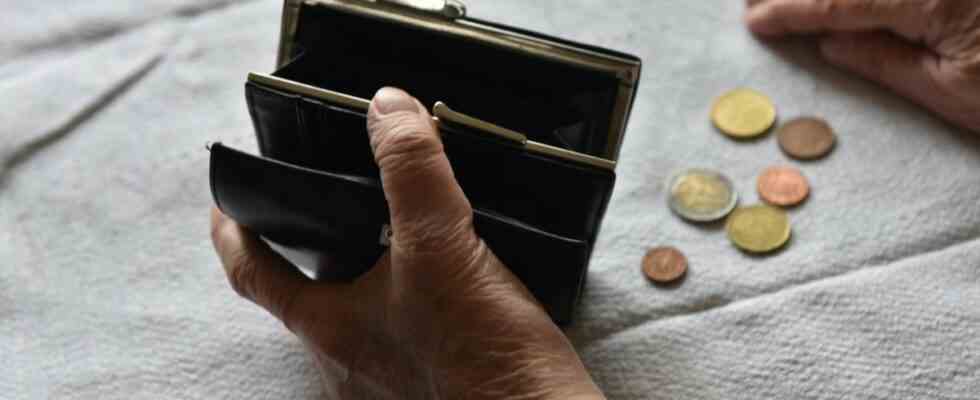Reported this a few days ago Federal Statistical Office a provisional inflation rate of 10.4 percent for October last year compared to October 2021. According to this, food prices have risen by 20.3 percent and in the energy sector by as much as 43 percent. Yes, this winter you’ll have to dig a lot deeper into your wallet than most people would probably like. But what if there is nothing more to grab at such depths of the purse – if the rising prices mean that the financial means are already used up, although the month is not over yet? How should people with little money survive the upcoming winter? The advice centers in the district of Ebersberg are not yet reporting any long lines of people seeking advice. But that’s not because the people in this country are too rich to care about the inflation rate – the reason for the lack of interest so far is to be found elsewhere.
At the social association VdK, both in the office for the district association and in the individual activities of the local associations, the rising cost of living is an issue that has been addressed again and again in recent weeks, as Doris Rauscher says. “People are concerned that it could be tight,” continued the Ebersberger VdK district chairwoman and SPD member of the state parliament. Could – that also means that the financial possibilities are not scarce at the moment. Or?
There hasn’t been a big rush so far, but the inquiries are already increasing
If you ask around further, then this conclusion is almost certainly wrong. “In the last few weeks there have been more inquiries about rising prices,” says the Central Social Service (ZSD) from the district office. As a counseling center, the ZSD is responsible for people who receive unemployment benefit II or basic security in old age and for those who are unemployed, as well as for anyone who wants initial financial advice. The district office does not collect concrete figures on how many inquiries there are currently compared to previous years. However, based on the description of specific cases, it can be seen that these would probably not have happened a year ago.
For example, the woman who turned to the ZSD for the down payment from her new electricity provider, as reported by the district office. Accordingly, she should pay 350 euros. A handsome price, which the electricity provider justified by rising energy prices – and which therefore probably would not have come about in 2021. After the ZSD got involved and tried to talk to the provider, the deduction was lowered to 300 euros, because in the meantime only the woman lived in the household, at the time of the change it was still a two-person household. But the newly negotiated price was also one that the woman could not afford, it is almost as high as her monthly income. So the woman submitted an extraordinary notice to the electricity provider, and with the help of the ZSD she is now looking for cheaper offers.
According to the ZSD, the topics in the consultations themselves had not changed significantly. For example, the increase in heating costs for the people who mainly make up the clientele of the advice center is not a big problem, since utility bills can be submitted to the responsible office. However, the situation of the people would have been “massively aggravated” by the inflation a vacuum cleaner or a washing machine, are often only possible with support from donations, since those affected can no longer build up reserves.”
Doris Rauscher has been district chairwoman of the VdK in the Ebersberg district since 2017.
(Photo: Peter Hinz-Rosin)
There is selective donation-based support, for example, at the VdK for club members. “When the government’s options have been exhausted, we can step in,” says Doris Rauscher. Incidentally, an offer that, according to VdK district manager Marin Stimac, should definitely become better known. “Unfortunately, our capacities for aid are not yet being used as fully as they could be,” he says.
It is probably not only due to a lack of awareness of the various donation-based offers of help. Because Rauscher also says: “Ask for help from an organization like ours is still very embarrassing for many people – if at all, people only come when nothing works anymore.”
Requests for advice from people who have previously managed without help will probably increase
The rising cost of living will also make it financially difficult for people whose income is just above the eligibility limit for state aid, as the ZSD says. A clientele that did not have much financial leeway up until now, but was still able to manage on their own. “We expect more inquiries from this side in the future,” said the ZSD.
Doris Rauscher’s view of the coming months is not characterized by optimism either. “It is becoming apparent that it could get worse than it has been so far.” The relief packages that have already been approved by the federal government for citizens give her hope. Another possibility for the SPD politician would be that support options are created at state level. Because one thing is clear to her: “It can’t be that in the end everything gets stuck on the social organizations or other donation-based aid.”

